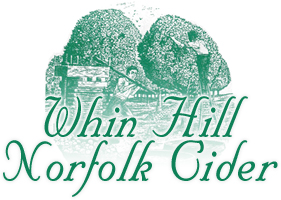
We are very aware of the environmental impact of our business and are taking a number of steps to improve the environment on our orchard and minimise the adverse effects of the production and sales sides.
The Orchard
In addition to producing an annual crop of quality fruit from our orchard, we aim to provide a natural, sustainable habitat with a rich biodiversity with many different species of flora and fauna.
Fruit tree spraying is essential since there are a large number or pests and diseases that can seriously affect fruit production and in some cases can actually kill trees. We follow a strict pest and disease control programme that sees spraying kept to a minimum to protect the orchard stock without harming the ecosystem that the orchard naturally creates.

Over the years, we have planted more than 2000 individual native trees and shrubs around the orchard. We have an abundance of beautiful, wild meadow flowers including Cowslips, Salad Burnett and Bee Orchids that carpet the orchard in a dazzling array of colours.
Around the trees, we have a herbicide strip to conserve water in a dry cliamte. We have a number of nest boxes within the canopy cover of the orchard and shelter belts used by tits, finches and a tawny owl.
We have large colonies of Bumble and solitary bees as well our own hives of Honey Bees kept on the orchard that pollinate the apple blossom each Spring. We also have a pond with frogs, toads, newts and dragonflies.
Carbon Emissions
Emissions of carbon dioxide are clearly implicated in global warming and need to be rapidly reduced to avoid very serious environmental impacts. The graphics below show our calculated Carbon Footprint in tonnes of CO2 in 2006/7 from various aspects of our business. They include both direct (e.g. fuel we use) and indirect (e.g. fuel used to make our glass bottles) emissions.
In 2006/7, Whin Hill Norfolk Cider calculated a Carbon Footprint of 18.6 tonnes of CO2 produced both directly and indirectly from various aspects of the business. This Footprint can be broken down into the following constituent parts:
1 tonne (5.4%) of our total Carbon Footprint comes from our orchard
4.3 tonnes (23.1%) of our total Carbon Footprint comes from processing
2.2 tonnes (11.8%) of our total Carbon Footprint comes from transportation
8.1 tonnes (43.6%) of our total Carbon Footprint comes from glass bottles
3.0 tonnes (16.1%) of our total Carbon Footprint comes from boxes, bags etc

Measures in hand to reduce this include:
- Lighter weight bottles (saves 1.3 tonnes)
- Bottle re-use ( 1.3 tonnes)
- Heat recovery from pasteurisers (0.45 tonnes)
- Electricity from Ecotricity
- 4kW Solar PV system installed in 2010(1.7 tonnes)
Current savings are 4.75 tonnes (26%) with plenty still to do! A major item to focus on in order to reduce our overall Carbon Footprint is greater bottle re-use.
Waste
We operate with relatively small volumes of waste. The main items are cardboard packaging which is either re-used or sent for recycling. Plastic film (pallet wrap for bottles), fertiliser sacks and pesticide containers are sent for recycling. The spent pomace left after pressing and the lees and sediment from fermentation are applied to the orchard as a soil conditioner.
